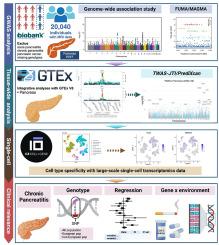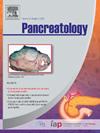Genome-wide association study identifies FUT2 rs601338 polymorphism linking intra-pancreatic fat deposition to chronic pancreatitis
IF 2.7
2区 医学
Q2 GASTROENTEROLOGY & HEPATOLOGY
引用次数: 0
Abstract
Background
Pancreas fat deposition, measured by pancreatic proton density fat fraction (PDFF) in the MRI, has emerged as a critical area of research within the metabolic field. However, its genetic basis and how genetic predisposition impacts the pancreatic disorders remain poorly understood.
Methods
We conducted a genome-wide association study (GWAS) in 20,040 European individuals (excluding those with acute/chronic pancreatitis and pancreatic cancer) from the UK Biobank. Subsequent post-GWAS analyses including colocalization, transcriptome-wide association studies (TWAS) and integrative analysis with single-cell transcriptomics were employed to identify genetic loci and prioritize genes enriched in pancreatic tissue. Regression models and interaction analyses were used to assess the impact of candidate genetic variant on the risk of pancreatic disorders.
Results
Our analyses identified 44 independent significant genetic variants near 14 protein-coding genes, including FUT2, CBFA2T2, FAF1, MAMSTR, SGMS1, CSNK2A1, CEBPB, and CEBPG. Genetic colocalization and transcriptome-wide association studies (TWAS) confirmed the essential roles of FUT2 and CBFA2T3 in the pancreas. Single-cell transcriptomics showed high FUT2 expression specifically in the exocrine pancreas (acinar and ductal cells). Notably, the polymorphism rs601338 in the FUT2 exon region can cause a stop gain mutation in protein translation. Regression analysis revealed that the rs601338 AA genotype was significantly associated with an increased risk of chronic pancreatitis (CP) across all populations in full adjustment model (OR 1.26 [95 % CI 1.07–1.48], p < 0.001; HR 1.24 [95 % CI 1.03–1.50], p < 0.001). Subgroup analyses revealed population-specific patterns: in Europeans, the AA genotype showed significant associations in logistic regression, while in non-Europeans, both GA and AA genotypes exhibited positive trends, with AA achieving statistical significance (OR 1.20 [95 % CI 1.01–1.41], p = 0.034). Sex-stratified analyses showed significant associations in elevated risk of CP in males (OR 1.33 [95 % CI 1.08–1.62], p = 0.006; HR 1.31 [95 % CI 1.04–1.67], p = 0.025) but not females with full adjustment. Interaction analysis indicated a synergistic effect of current smoking and the rs6031218 AA genotype on CP risk, while COX-2 inhibitor treatment might reduce CP risk in rs6031218 AA individuals.
Conclusion
This study identified novel genetic variants for pancreatic PDFF and confirmed related genes functions in the pancreas. These findings emphasize the need for regular surveillance of pancreatic fat deposition in the population with a high genetic risk based on FUT2 polymorphism, which could facilitate risk stratification and tailored therapeutic approaches for the primary prevention of CP.

全基因组关联研究发现FUT2 rs601338多态性与胰腺内脂肪沉积与慢性胰腺炎有关。
背景:胰腺脂肪沉积,通过MRI中的胰腺质子密度脂肪分数(PDFF)来测量,已经成为代谢领域研究的一个关键领域。然而,其遗传基础和遗传易感性如何影响胰腺疾病仍然知之甚少。方法:我们对来自英国生物银行的20,040名欧洲人(不包括急性/慢性胰腺炎和胰腺癌患者)进行了全基因组关联研究(GWAS)。随后的gwas分析包括共定位、转录组全关联研究(TWAS)和单细胞转录组学整合分析,用于鉴定遗传位点并优先考虑胰腺组织中富集的基因。使用回归模型和相互作用分析来评估候选遗传变异对胰腺疾病风险的影响。结果:我们的分析在14个蛋白质编码基因附近发现了44个独立的显著遗传变异,包括FUT2、CBFA2T2、FAF1、MAMSTR、SGMS1、CSNK2A1、CEBPB和CEBPG。遗传共定位和转录组关联研究(TWAS)证实了FUT2和CBFA2T3在胰腺中的重要作用。单细胞转录组学显示FUT2高表达,特别是在外分泌胰腺(腺泡和导管细胞)。值得注意的是,FUT2外显子区域的rs601338多态性可导致蛋白质翻译中的停止增益突变。回归分析显示,在完全调整模型中,rs601338 AA基因型与所有人群慢性胰腺炎(CP)风险增加显著相关(OR 1.26 [95% CI 1.07-1.48], p < 0.001;HR 1.24 [95% CI 1.03 ~ 1.50], p < 0.001)。亚组分析显示群体特异性模式:在欧洲人中,AA基因型在逻辑回归中显示显著相关,而在非欧洲人中,GA和AA基因型均呈现正相关趋势,AA具有统计学意义(OR 1.20 [95% CI 1.01-1.41], p = 0.034)。性别分层分析显示,男性患CP的风险升高有显著相关性(OR 1.33 [95% CI 1.08-1.62], p = 0.006;HR 1.31 [95% CI 1.04-1.67], p = 0.025),但完全调整的女性没有。相互作用分析表明,当前吸烟与rs6031218 AA基因型对CP风险有协同作用,而COX-2抑制剂治疗可能降低rs6031218 AA个体的CP风险。结论:本研究发现了胰腺PDFF的新遗传变异,并证实了相关基因在胰腺中的功能。这些发现强调需要基于FUT2多态性对高遗传风险人群的胰腺脂肪沉积进行定期监测,这可以促进风险分层和针对CP一级预防的定制治疗方法。
本文章由计算机程序翻译,如有差异,请以英文原文为准。
求助全文
约1分钟内获得全文
求助全文
来源期刊

Pancreatology
医学-胃肠肝病学
CiteScore
7.20
自引率
5.60%
发文量
194
审稿时长
44 days
期刊介绍:
Pancreatology is the official journal of the International Association of Pancreatology (IAP), the European Pancreatic Club (EPC) and several national societies and study groups around the world. Dedicated to the understanding and treatment of exocrine as well as endocrine pancreatic disease, this multidisciplinary periodical publishes original basic, translational and clinical pancreatic research from a range of fields including gastroenterology, oncology, surgery, pharmacology, cellular and molecular biology as well as endocrinology, immunology and epidemiology. Readers can expect to gain new insights into pancreatic physiology and into the pathogenesis, diagnosis, therapeutic approaches and prognosis of pancreatic diseases. The journal features original articles, case reports, consensus guidelines and topical, cutting edge reviews, thus representing a source of valuable, novel information for clinical and basic researchers alike.
 求助内容:
求助内容: 应助结果提醒方式:
应助结果提醒方式:


